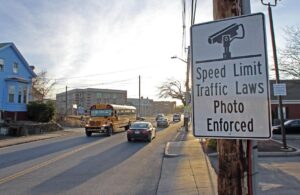by The Cowl Editor on March 15, 2018
Opinion

by Sarah Kelley ’18
Opinion Co-Editor
While Providence College students and faculty were enjoying spring break last week, the state of Rhode Island was dealing with major pushback following reports of the impact of newly installed school-zone speed cameras in the capital city.
The speed cameras—initially approved by Rhode Island lawmakers through the passage of the Automated School-Zone-Speed Enforcement Act in 2016—are allowed to be installed within a quarter-mile of any school in the city. Through the use of these cameras, tickets are issued for vehicles caught operating at least 11 miles per hour over the designated speed limit Monday through Saturday between 6 a.m. and 8 p.m. The minimum fee for any speed violation starts at $95.
To most concerned citizens, while aggressive, this kind of legislation would appear to be a proactive way to slow down speeding drivers in some of Providence’s most vulnerable neighborhoods. Increasing drivers’ accountability in the city has proven crucial, especially following the tragic death of a Mount Pleasant High School teacher who was struck down while crossing the road next to the school in 2016.
Yet recent media coverage of the speed cameras’ impact on Providence and its citizens has shifted focus away from the importance of citizens’ safety, and towards the economic implications of this assertive policy.
Most recent traffic violation data has reported that between Jan. 16 and Feb. 22, 12,193 tickets were generated by five speed cameras located primarily around Mount Pleasant Avenue, Charles Street, and Thurber’s Avenue in Providence.
This statistic is alarming for the first 33 days of the city’s utilization of the speed cameras, and will likely increase if speed camera installment is expanded to other areas of Providence.
Yet as recent media coverage demonstrates, many citizens and lawmakers alike are not necessarily associating this statistic with a threat towards public safety, but rather with the economic implications for those drivers caught speeding.
Recent news coverage has reported citizens challenging the intentions of the policy with over 2,600 tickets scheduled on the docket for appeal in Providence Municipal Court this past Monday alone, with many calling the new speed cameras an easy method for the state to generate revenue.
Others claim the $95 minimum ticket is overly burdensome for many citizens to pay. Some lawmakers are now making efforts to rid the state of the cameras completely, such as Anthony Giarrusso, Republican representative from East Greenwich, who called the cameras a “government cash grab.”
While economic aspects of the new policy should not be overlooked or downplayed, there is a question of whether the media is justified in greatly ignoring the reality of public safety for the sake of citizens’ pockets.
How can we balance the punitive fines that are necessary for the promotion of citizens’ safety and responsible driving with the demands of the public to lessen the very disciplinary penalties that would allow for the speed cameras’ success?
Perhaps allowing for initial warnings before fines, or reduced fines, would do well to assuage the initial pushback. Councilwoman Sabina Matos has championed the idea of increasing public education, outreach, and improved signage for the program, to improve public understanding before more cameras are installed.
While there is no denying that more work needs to be done in order to improve the success and efficacy of speed cameras, as well as to ensure the wellbeing of Providence citizens, media, lawmakers, and citizens alike should not overlook the reality of public safety, especially in school zones, for the sole sake of economic interest.